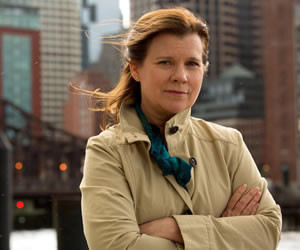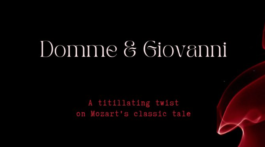 On Tuesday, January 28 at 7PM, Elisabeth Elo will be appearing at The Brookline Booksmith, 279 Harvard Street, to read from her new thriller North of Boston.Tough, Boston-bred Pirio Kasparov has just survived a horrifying accident—a freighter runs into her friend Ned’s fishing boat, killing him. Pirio is unnerved, wondering if it was truly an accident, or is there something more sinister afoot?
On Tuesday, January 28 at 7PM, Elisabeth Elo will be appearing at The Brookline Booksmith, 279 Harvard Street, to read from her new thriller North of Boston.Tough, Boston-bred Pirio Kasparov has just survived a horrifying accident—a freighter runs into her friend Ned’s fishing boat, killing him. Pirio is unnerved, wondering if it was truly an accident, or is there something more sinister afoot?
I recently caught up with the Brookline writer by email.
Brookline Hub: I read that your new thriller North of Boston had an unusual conception—you got the idea for it after discovering a book on ambergris, which is “hardened whale excrement and/or vomit once believed to have magical, curative, and aphrodisiac powers.” Can you explain a little more about how this germ of an idea flowered into a book?
Elisabeth Elo: Actually, North of Boston started about ten years ago with the voice of a character. I knew that she had a fear of drowning, that she was a survivor who needed a big adventure to find herself, and that part of her story would take place on boats. I did a lot of work in the early drafts on her voice, her personality, and her relationships, but the story never really took off, and eventually I put the project aside.
I read a lot of non-fiction, and I had been reading about perfume and the sense of smell simply because the subjects interested me. I had also worked in an aquarium when I was in high school and had had some experience with marine mammals. I knew whales were going to figure in my character’s story somehow. When I came across the subject of ambergris it was a little “a-ha!” moment for me. Ambergris is material from the stomach whale that floats in the sun and washes up on beaches. It’s oily and resinous, with a marine, slightly fecal smell, and it used to be used (in some cases, still is) as a base in the most exquisite perfumes. I loved the paradox, the fusion of opposites. To think that something so disposable could be transformed through natural processes into something so valued. And, of course, I loved the way it brought two of my interests together.Suddenly, I had found a way to go forward with the book.
BH: How long did it take you to go from an idea to a finished novel? How did you research it?
EE: Well, as I said, I began work on the novel about ten years ago and ended up putting it aside. When I picked it up again some years later, it was because I felt (this is going to sound crazy) that I owed it to Pirio. I think it was the commitment to the character that made the difference. It took me about three years to write the book once I had picked it up again. I don’t know if that’s fast or slow—that’s just how long it took given my life and my other responsibilities.
BH: Did you have anyone in mind—real or imagined—when you conjured up the character of Pirio Kasparov?
EE: I think I’ve often felt disappointed in the female characters I’ve met in fiction. Naturally I would have things in common with them, but on a deeper level I couldn’t relate. Pirio is a “different” female character, I guess, but in another sense she’s not at all hard for people to relate to – at least this is the feedback I’m getting so far. My hope is that readers will just be able to roll along with her, knowing she’s different, but also enjoying a fair amount of gratifying identification.
She’s a tough girl, for sure. Though she’s been compared to Lisbet Salandar and Smilla, I actually don’t think those comparisons are apt. Those girls are tough through and through, and a lot more closed off. Pirio is tough but she’s also vulnerable, and she’s actively trying to be a better person in both her relationships and her work life. There’s a part of her that really wants to connect with others and make a contribution to society. But, like so many of us, she’s got some problems to work out first.
BH: What authors do you read? Have any of them been influential in your writing?
EE: I love Edna O’Brien. She writes the most beautiful prose I’ve ever read. I saw her read once a long time ago at the Boston Public Library. She read a scene that described horses copulating, and I still remember the feeling of awe I had. This was long before I had started writing myself. I believed then that I couldn’t be a writer because I didn’t have anything to say. I saw my life as gray and thin (which it really wasn’t) while imagining hers as rich and complex. Eventually I realized that writers really don’t have more interesting lives than the rest of us. In the process of writing, they bring depth and meaning to their experiences, and then offer that to us as a gift. We readers pick up their books and learn through them how to bring depth and meaning to our own lives. I can’t imagine what life would be like without the gifts they give and the things they teach us to do.
I also love Edward St. Aubyn, author of the Patrick Melrose novels. St. Aubyn is a first-rate literary stylist with a razor-sharp, intensely observant mind. He fictionalizes his childhood abuse and later addiction in a way that I think no one else has done.
He skewers practically everything, including himself, without ever getting the tone wrong — which is amazing when you consider his material and all its possible pitfalls.
BH: You teach writing in Boston. What advice would you have for aspiring authors looking to write and publish their first book?
EE: The best advice is the stuff we’ve all heard before. You’ve got to read a lot, observe a lot, and be true to yourself. You’ve got to find your material, which isn’t always an easy thing to do, and you’ve got to put in the hours.Then you’ve got to be patient as those hours stretch into days, weeks, months, and years. I don’t think aspiring writers should worry about publication at all until they have a finished book they really believe in. The writing is the important thing. It’s got to come first.
When you have your good book tucked under your arm, you just do what everyone else who is trying to get published does – you go to conferences where agents hang out, or you look for agents in directories and, if you’re lucky, the road to publication begins. But you have to keep your expectations in line. With a few notable exceptions, getting a novel published is not a smooth process.
While you’re doing this, you need to keep writing. That’s your solace and the way you get better. If you think you’re the type of person who absolutely must be published in order to feel halfway decent about yourself, then I don’t recommend that you write. If you’re looking for money, you’d be crazy to go this way. The only reason to write fiction is because it makes you happy.
BH: How long have you lived in Brookline? What do you like best about living in this town?
EE: I lived in Brookline for several years when I was in my late twenties and early thirties. Then, when my son was two, we went up to Newburyport and lived up there for a while. We came back to Brookline four and a half years ago to take advantage of the schools. I love living here. I love the people, the restaurants and shops, and how close I am to everything I want to do. As far as I’m concerned, there’s no good reason to live anyplace else.
—Jennifer Campaniolo











